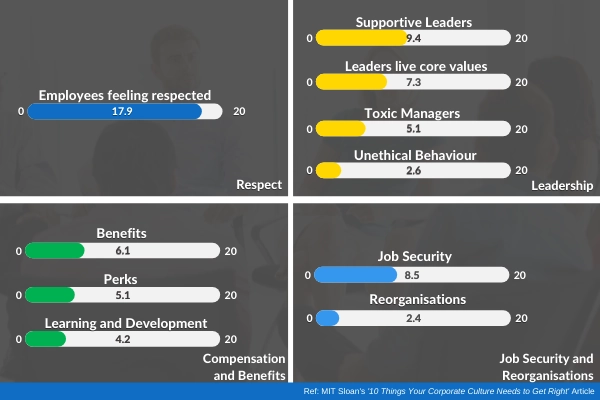Leadership impact company culture and has a vital role to play in setting the culture for their organisations. 45% of the respondents in a LinkedIn poll with over 32k votes ranked company culture as the most important factor when they are looking for a role. Company culture ranked higher than salary and flexibility.
Company Culture is Underpinned by Your Values
Your company culture defines how you do things ‘here’, in your organisation. It is underpinned by your values. The company culture is a summation of attitudes and behaviours. It portrays how people interact with each other. How leaders interact with your employees and how employees interact with each other. In today’s employment market, and with the talks of the ‘great resignation’ post-pandemic, employees and prospective employees have evaluated what is important to them. For most people, it is about working for an employer who shares their values. Whose values align with theirs. It, therefore, matters to employees how you as an employer and as a leader treat your employees and other stakeholders. Employees care about how you, their employer approaches corporate social responsibilities. They care about the impact they; the employees make and the impact you make as a leader and as an employer.
The past two years have been marked by unprecedented events – the global pandemic. Everyone had an opportunity to reflect on what is important to them. As a leader, you would have had lots of iterations of your plans and strategies and the impact of the pandemic, remote working etc on your organisation and your workforce. You will also probably have noticed the impact of the pandemic on your organisational culture.
How did the pandemic impact you and your leadership style? How did you shape your organisational culture during this period? Did you see a sudden shift in your focus towards your employees’ safety and wellbeing?

Respect is the most Important Factor
In another survey by the MIT Sloan Management Review, employees cited feeling respected as the most important factor when it comes to company culture. These companies are perceived as having good culture. This was followed closely by supportive leaders and leaders who live by core values.
The same study showed that friendly colleagues, flexible schedules and manageable workloads had no impact on company culture. This shows that as a leader, you need to play an active role and take conscious steps to ensure that you are making a positive impact. You will need to demonstrate that you are supportive and empathetic. You cannot leave it to your employees. Your employees will have to see that you live by your core values. Thus, you will have to lead by example. More importantly, you will need to treat your employees with respect. The culture of your organisation will therefore have to be one that encourages respect for all employees. One that people feel respected in.
Your outlook on your employees’ journey needs to be positive. These must be supported by actions. By creating a positive experience for your employees, from the time they engage with your organisation through your recruitment process through to their lived experience when they are onboard and part of your organisation.
A Good Company Culture is having Open and Transparent Communication Channels
Of course, having the right perks are crucial. Your reward and compensation strategy, flexible working arrangements, are all important. However, a key component to establishing a good company culture is having open and transparent communication channels. Transparency leads to an increase in trust in leadership. Your ability to create a trusting environment where your employees trust in you as their leader increases loyalty. Trust goes both ways. You need to be able to equally trust in your employees. You will also have to trust them to perform their roles and to deliver. Leaders through such actions can promote and encourage innovation.
Giving constructive feedback to your employees is also vital. Your feedback needs to be concise, meaningful and timely. As a result, it helps clear any ambiguity. By doing this, you will also help your employees understand what they are doing well and where they will need to improve. In companies with good culture, feedback is encouraged from all. Your employees must also be able to give you feedback where appropriate. Listen to your employees and what they have to say as it may help you prioritise and know where to invest your resources.
You have a duty to create a happy working environment. A fun working environment where your employees enjoy what they do believe in what they do and the impact they have on your organisation and its stakeholders. Employees are more productive when they are happy. Morale levels will also be high.
Avoid a ‘Blame’ Culture in the Company
If you would like to grow and develop your organisation and culture, you must avoid blame culture. Some leaders have a habit of apportioning blame. It is always someone else’s fault. Such leaders rarely pay attention to what the route cause of the issues are. They do not take a strategic or practical approach to problem-solving. They take an easy way out. It is easier to blame someone for a failing than to come to terms with the fact that a strategy and how it is being implemented for example is not working. Or the fact that not providing training for employees, for example, has contributed to poor performance.
Leadership impact on company culture must be a priority for all leaders. Your impact on people will remain long after they have left your organisation. Remember, you are your company’s brand ambassador. Leave a positive impact.

